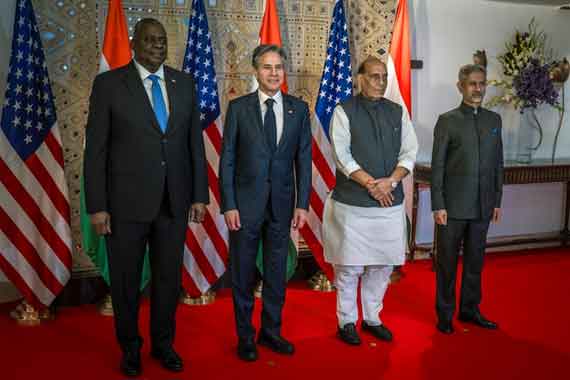
In an era marked by geopolitical shifts and strategic realignments, the recent introduction of the “U.S.-India Defense Cooperation Act” by Senator Marco Rubio demands our attention. This legislation, which aims to solidify defense ties between the United States and India in light of perceived threats from China, goes beyond mere military collaboration; it is a carefully crafted maneuver that seeks to redefine the security landscape of South Asia.
The bill explicitly supports India’s territorial integrity, proposing increased military cooperation and strategic investments that could elevate India’s standing to that of key U.S. allies like Japan and Israel. However, this initiative also comes with a worrying mandate: it requires the U.S. to report on Pakistan’s actions against India and could restrict security aid to Pakistan if it is deemed to be sponsoring terrorism. This directive not only portrays Pakistan as a perpetual adversary but also serves to further entrench the narrative that has been propagated by India for decades.
The Fabricated Narrative
India has adeptly used the specter of cross-border terrorism to divert attention from its own transgressions, particularly in Jammu & Kashmir (J&K). As Kashmiris continue their struggle for self-determination, the Indian government portrays itself as a victim of terrorism, a narrative that gains traction thanks to the support of the U.S. This move reflects a duality that is emblematic of U.S. foreign policy, one that prioritizes strategic partnerships over human rights and justice.
The hypocrisy is glaring. While the U.S. has advocated for democracy and human rights on the global stage, it often compromises these values when they conflict with its geopolitical interests. The U.S. stands firm against Russian aggression while simultaneously turning a blind eye to India’s actions in IIOJK. The abrogation of Article 370 in 2019, which stripped Kashmir of its special status, and the ongoing human rights abuses perpetrated against the Kashmiri people, have been met with silence from Washington. It is troubling to see Pakistan, a strategic ally in the fight against terrorism, being painted with a broad brush based on the narratives crafted by India.
Geopolitical Calculations
The U.S.-India partnership, while framed as a bulwark against Chinese expansionism, serves to entrench the status quo in South Asia, creating an environment ripe for further conflict. The dual standards exhibited by U.S. policymakers, who advocate for human rights in some contexts while overlooking them in others, raise questions about the sincerity of their commitments. India’s accusations against Pakistan, often echoed by U.S. lawmakers, distract from its own failures in J&K and highlight the need for a more nuanced understanding of regional dynamics.
Moreover, the Indian lobby in the U.S. is adept at leveraging developments in J&K against Pakistan, using the Rubio bill as a vehicle to legitimize its agenda. This is not merely a matter of policy; it is a concerted effort to reshape public perception and international narrative in favor of India. The Kashmiri struggle for self-determination, recognized by the UN as a fundamental right, has been overshadowed by the framing of Pakistan as the antagonist in this geopolitical drama.
Human Rights and Democratic Values
The contradictions between the proclaimed values of democracy and human rights, and the realities of U.S.-India relations, cannot be overstated. The U.S. has historically supported authoritarian regimes when it suits its strategic interests, and India is no exception. The Indian government’s brutal treatment of Kashmiris, characterized by killings, arbitrary arrests, and systemic oppression, runs counter to the very ideals that both the U.S. and India claim to uphold.
While the U.S. champions democracy and human rights, its silence on India’s actions in IIOJK exposes a fundamental hypocrisy. The ongoing human rights abuses have fueled the Kashmiri freedom movement, drawing parallels with global struggles for liberation, from Algeria to South Africa. Yet, this legitimate struggle is dismissed, as India resorts to blaming Pakistan to deflect criticism of its own actions.
The Strategic Implications
The U.S.-India Defense Cooperation Act also reflects a concerning trend: the prioritization of military cooperation over diplomacy. By mandating reports on Pakistan’s alleged actions, the bill shifts focus away from constructive dialogue and conflict resolution. This sets a dangerous precedent, fostering an environment of distrust and hostility that can only exacerbate regional tensions.
In the broader context, the U.S.-India partnership underscores the complexity of alliances shaped by historical grievances, economic ties, and geopolitical ambitions. The Indian government’s attempts to alter the demographic composition of Kashmir and its military control over the region can be seen as an occupation, drawing the ire of the international community. Yet, the silence of the U.S. and its allies on these issues reveals the selectivity of their advocacy for democracy and human rights.
Conclusion
As Pakistan navigates these tumultuous waters, it must remain steadfast in its commitment to its sovereignty and the rights of the Kashmiri people. The U.S.-India alliance may present challenges, but it also provides an opportunity for Pakistan to reaffirm its strategic position in the region. By emphasizing its role as a counter-terrorism ally and a champion of human rights, Pakistan can reshape the narrative and counter the harmful effects of the Rubio bill.
In this age of shifting alliances and complex geopolitical dynamics, the resilience of Pakistan’s diplomatic efforts will be crucial. As the U.S. continues to engage with India, the onus lies on Pakistan to articulate its perspective and remind the international community that the quest for justice and self-determination cannot be sidelined in favor of geopolitical expediency. The path forward is fraught with challenges, but through cohesive strategy and unwavering resolve, Pakistan can counter the narratives that seek to undermine its legitimacy on the global stage.
